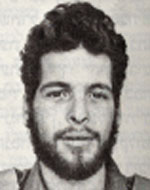Dov, son of Ester and Azriel, was born on Kibbutz Ein Harod Ihud on March 4, 1949. In the kibbutz he completed his elementary and high school studies, and Dubi, as his friends and family called him, excelled in his class He was attentive and vigilant, always willing to accept and criticize, and he had the seriousness, responsibility, and judgment of an adult, and from his childhood there were two basic characteristics: the sense of responsibility and the pursuit of justice and the love of nature and of the land. In the company of the children, it was evident not only in social activity and in everyday life, but also in the responsibility that he took upon himself in every field he dealt with He grew up in the company of the children and raised rabbits and pigeons next to his home, and as he grew older, his hobby became a cherished and in-depth preoccupation. – The cowshed, thanks to his great devotion to work in general and to Perez in particular, soon became one of the senior workers in this industry, and during the Six Day War he became one of the pillars of the cowshed. I was amazed at the diligence and dedication he showed at work. He worked for many hours, above and beyond the requirements, bore the full responsibility and was already one of the main people in the industry … Dovi had a strong connection with the agriculture through his hard work in that industry. “Dov was drafted into the IDF in early November 1967 and volunteered The paratroopers. During basic training he was hit in the legs and assigned to the Intelligence Corps. After basic training and after completing his air reconnaissance courses, officers and intelligence officers, he was assigned to an intelligence unit in the Northern Command. During his service he worked hard and loved his job. After his release he was called for periods of active reserve duty, underwent an aerial photography course and was assigned to the Armored Corps. After the liberation, Dubi returned to the kibbutz, to work in the cowshed and to daily life in the kibbutz, but increased his activity in the company and was elected a member of the secretariat. He loved the farm, but he did not ignore his problems, and for the two years he lived and worked in the kibbutz he worked energetically to change and correct distortions. At the time, he devoted himself to the rehabilitation of his father, who was sick, and spent many hours every day caring for him. At the end of 1971, Dubi went to serve in the movement, first in the Union Brigade and later as the head of factories in the Scouts. During this period, he organized numerous trips, camps and activities, as well as the 11th Jamboree. His work in the brigade was written by one of his friends at that time: “There was someone to rely on … a word was a word … there was time, and there was a place … he would run around, rush, wake, prod, scold – all with unflagging dedication and deep faith. , Because it is not enough to do the good – it must also be done well. ” There was a sense of responsibility and conscience in his work, and he cared about everything. He was prepared to fight as hard as he could for principles he thought were right and right. Dubi traveled extensively throughout the country and devoted special attention to the historic past of the various places. He loved the landscapes of the country, and tried to impart this love to others as well – by organizing trips, camps and circles for the knowledge of the country. “He was eager for the country as a young man whose love was not his fill of wealth, and he always had some new surprises for him, and he liked to tell about the experiences of his service as an intelligence officer or about his travels at this time, Most of all he was eager to hear, to listen, to experience and to add to his likeness from the good of the land, reserved for its lovers only. ” At the end of one of the tax tripsGareth, a Dubi entrepreneur, organized a booklet entitled “Defining the People in the Pool” as a summary of observations with students. In the Yom Kippur War, Dubi was called to service. On the 11th of Tishrei 5734 (October 11, 1973), in the battle that was raining in the Golan Heights about three kilometers before the Ma’atz Junction, Dubi’s half-track was hit, and when he tried to jump off, he was hit and killed. He was laid to rest in the cemetery of Ein Harod Ihud. After they fell, the journalist Baruch Nadel wrote about Dubi in the army: “He was the sort of commander we read in books: sitting in the half-track, outside the steel walls, to see the battlefield better; And only then tries to extricate itself. “Kibbutz Ein Harod Ihud published a pamphlet in memory of the kibbutzniks who fell in the Yom Kippur War, and Dubi among them, with the words of friends about his character And his actions.
